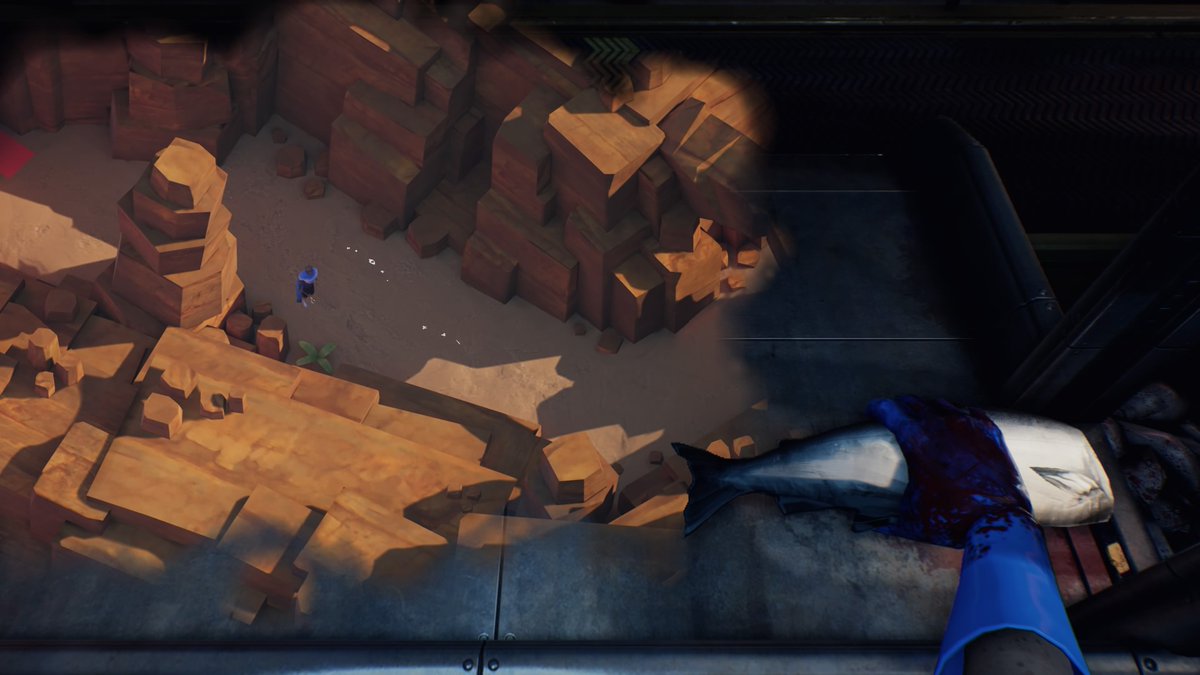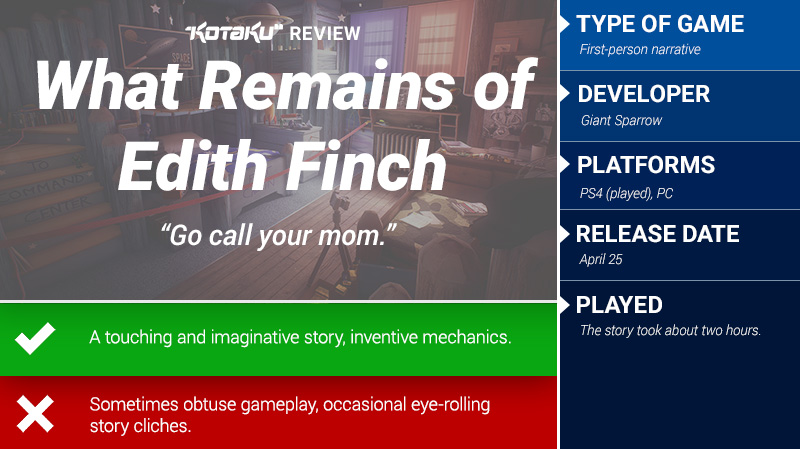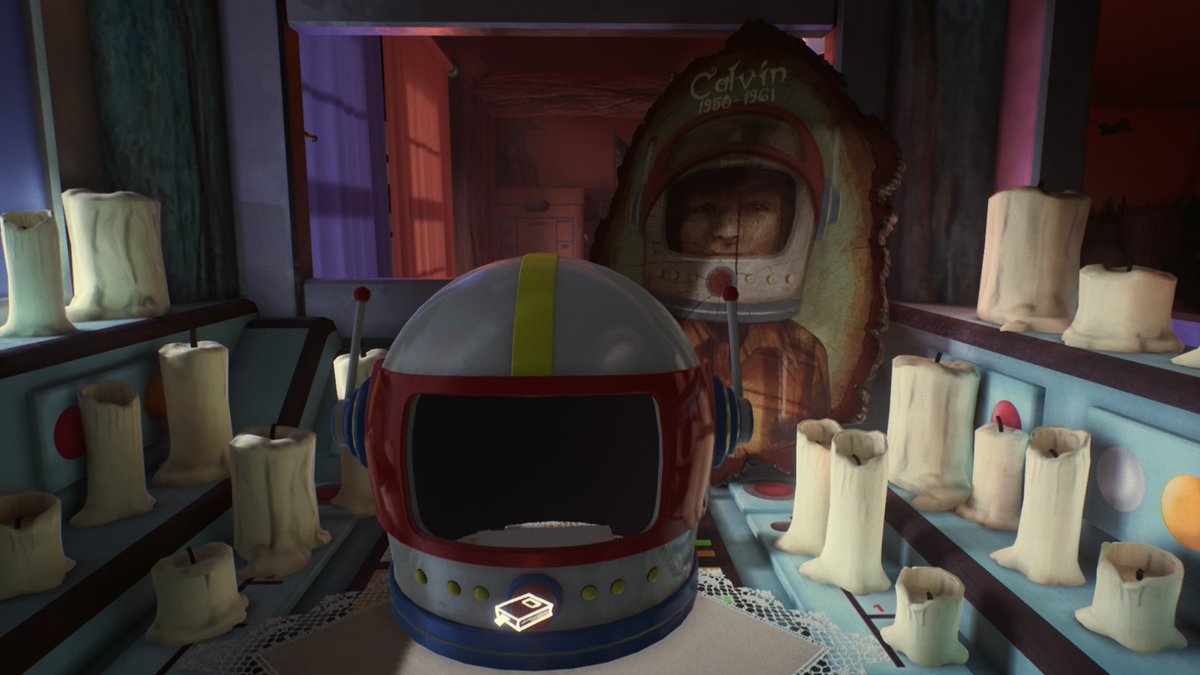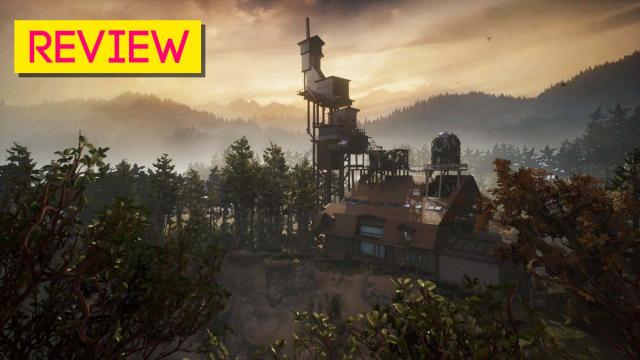What Remains of Edith Finch is a story about family, the nature of life, and the unknowability of mortality. In the end, whatever flaws Edith Finch may have are outshined by its imagination, wonder, and the sincerity with which it approaches these topics.
You play as Edith, the last member of the Finch family, returning to her abandoned childhood home. The doors to all the bedrooms have been sealed up, but her mother has left her a key that opens secret passageways throughout the house. Each room you enter is a museum of its previous inhabitant, perfectly preserved from the last time they were there.
You begin with Molly, who died in 1947 — within her bedroom, you play through the night just before her death. Each bedroom follows the same template: each new room contains a small story about the person who lived there in which you take on the role of one of the participants. In one, you fly a kite. In another, you play out a schlocky 1970s horror comic. You play as various predators stalking their prey. You flip a flipbook. You take photos on a camping trip. One of my favourite sequences puts you in the perspective of a baby in the bath, his father imagining what it is he laughs at when he’s alone.
While Edith Finch will no doubt garner comparisons to Gone Home, its execution is very different. You aren’t just reading about absent family members. You embody them, experiencing their lives as they saw them.

When it works, it really works. By far the most inventive and effective vignette puts you in the shoes of a young man working at a cannery, slicing fish heads by swinging the right analogue stick, moving his hand from one side of the screen to the other. As his imagination wanders, another game entirely sprouts on the left side of the screen, which you control with your left analogue stick. It begins as a top down labyrinth, then an isometric journey through a city, and then engulfs the screen entirely. You play both simultaneously, experiencing the mundanity of the young man’s job at the same time as the richness of his inner world. It builds a sense of character in the only way a game can, and makes the conclusion of this story all the more touching.
When the stories don’t work, or when they veer towards the sentimental, the game is at its weakest. Edith Finch strives to be capital M meaningful, and for the most part it succeeds, but sometimes it leans on the cliché. Sometimes, the stories of Finch family are just plain boring. A child angry at his dad for remarrying is struck by lightning, and it’s so absurd it almost seems like a joke. The aforementioned horror comic drags on way too long, and while the visual style of dividing up the screen into panels is interesting, it becomes difficult to understand where you are and where you’re going.

What Remains of Edith Finch wants to be literary, with Edith’s narration appearing as text you walk around and through on the screen, but at times the game’s desire for narrative feels at odd with its gameplay. Because it never wants to call attention to its gaminess, it can’t or won’t make the next step in the story too obvious. If you’re stuck, even if the solution makes perfect sense once you figure it out, suddenly the game becomes very boring. There is no more effective way to lose the magic of a deeply metaphorical and personal tale than to be careening the camera all over the screen, wondering what in the hell the game wants from you. It’s hard to say if stronger or clearer hints would help, but there were moments when I wanted them.
Ultimately, Edith Finch is about the story, and the occasionally obtuse gameplay didn’t bother me that much. While I liked its resolution — or lack thereof — I wonder if it’s too subtle in making its point. At the end of the game, Edith narrates, “If we lived forever, maybe we’d have time to understand things. But as it is, I think all we can do is open our eyes, and appreciate how strange and brief this all is.” The beginning of the story dabbles in the fantastical, makes mention of a family curse and monsters and a power unknown toying with the Finch family. At the end, you won’t have an answer to whether or not those things are real, but the story couches its magical realism in enough layers that the Finch family curse can both be a boogeyman and a real threat.

Edith Finch is not really about what’s true or what’s not. It’s about what the Finch family remembers. As I played, I kept thinking of a story my mum told me when I was younger. When she was a teenager her father dumped her in a finishing school in a country where she didn’t speak the language, with no money. Her fellow students were much more wealthy than she, and she didn’t trust them. She kept a diary and twisted her handwriting into a kind of code, sure only she could read it. One day, the teachers at the school took the students on a field trip to a famous jewellery maker, and allowed each student to buy one piece of jewellery. These teachers had never been particularly kind to my mother, but as they watched every other girl buy a piece of jewellery, I suppose they felt some kind of pity for her. When they returned to school they handed my mother a small box with two pearl earrings in it. My mother still has those pearls, and she told me she wonders, sometimes, how she felt that day. But she can no longer read her diary.
When Edith arrives at the Finch house, she says that she had questions about her family that only the house can answer. But the house could never answer them all. Family is a tangle of resentment and faulty memories, as well as love, as well as duty. You may strive to understand the people who raised you all your life. Edith Finch says it’s ok if you reach death without getting those answers. The ending of the game feels overly literal. As one character dies, another character lives — using the birth of a child to illustrate the wonder of life is a little cloying. But the narrative was clearly hurtling towards that imagery since the very first moment of the game. Even as I rolled my eyes at the chilchéd final moments, as the credits rolled, I found myself remembering the dark, cluttered halls of the Finch house, and the way the game denied me closure on every mystery they may contain.
At the very end, What Remains of Edith Finch asks us not to be sad that our loved ones are gone, but to be amazed that anyone had a chance to be there at all. It’s a reminder that people — even the ones you love the most — are unknowable, but also precious. Keep them close to you, even if you may not ever understand them.

Comments